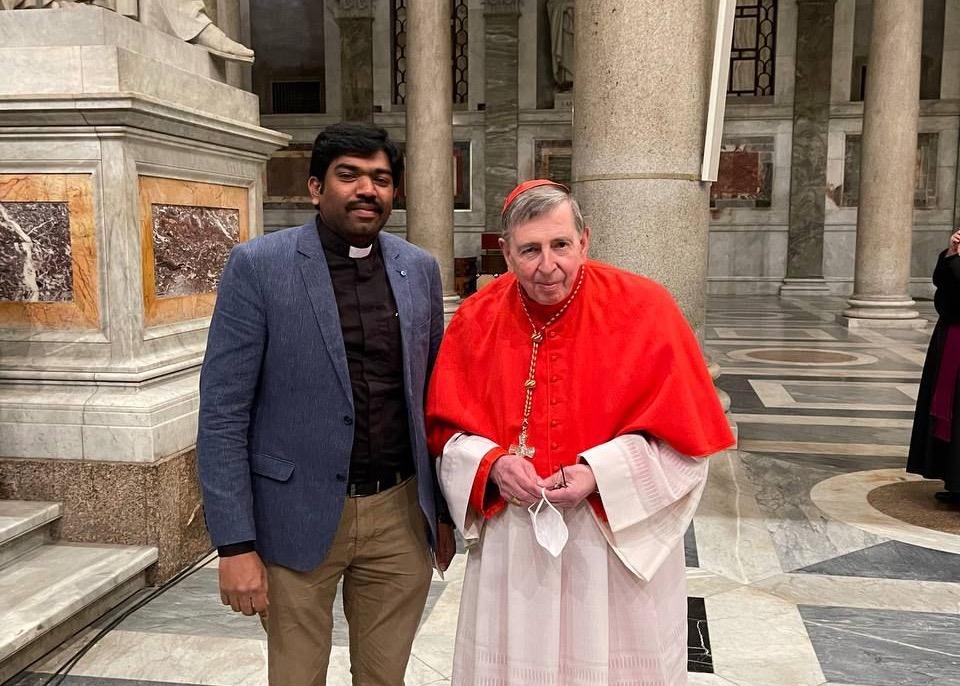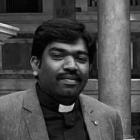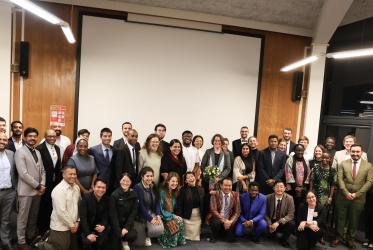One of the things which was emphasized in the discussion was that this pandemic has exposed the “common destiny” and “common shared vulnerability” which invites the churches for a “shared mission.” Bishop Jari Jolkkonen of Finland reiterated that “common suffering should unite us and not divide us.” Diaconal mission is a platform for this mission towards unity. The need of the churches to come together to distribute vaccines along with government agencies and to clear the misconceptions about the vaccines was also highlighted.
The pandemic reveals the truth that churches and ecclesial communities are interdependent and there is mutual exchange of information related to use of media and other ways of responding to the pandemic. Most of the panelists agreed that one of the impacts of the pandemic is the digitalization of churches, and this has helped people across the globe to meet virtually to pray together. This has created new ecclesial understanding that church as community is more than a building. This digitalization has reached the grassroots and it is very helpful for ecumenical endeavors. If it was the invention of the printing press that paved way for the reformation in the 16th century to spread fast, likewise, in this 21st century, digitalization is a fertile soil for ecumenism. Having said that. there are still ecumenical challenges related to sacred spaces and virtual celebration of sacraments.
It is a lifetime opportunity to get into the headquarters of the Catholic church and to interact with different dicasteries of Roman Curia. The way we were welcomed and the programs the Pontifical Council for Promoting Christian Unity arranged for us leaves a strong impression that Catholic Church is genuine and serious in ecumenical co-operations. There were three times we met the Pope and we were allotted front rows and during the interactions with various dycasteries, we interacted with the priests who are heading them, and we felt honored. It is good to learn that the Catholic Church is engaged in a synodal process starting from the local context. Pope Francis believes that ecumenism is the exchange of gifts and has given the important advice to “listen” to everyone including non-Christians. The charismatic renewal which is happening within the Catholic Church and the importance given to Holy Spirit is something amazing to observe through the interaction with CHARIS. Although women are not appointed as priests it is good to see women leading many ministries and also to witness the Pope consecrating women as lectors and catechists. There is also a commission appointed by the Pope to analyze the subject on women in the priesthood. There is a tendency to think that the Catholic Church is hierarchical in structure but the interaction with various religious orders and Focolare movement helped us to understand the prominence of lay people in the Catholic Church. The visit to historical places like catacombs, necropolis, museums, and colosseum helped to relate to the histories which we have learned in the textbooks.
We had different sessions which highlighted the dialogue between Catholic Church and other denominations as well as other faiths. Cardinal Kurt Koch, president of the Pontifical Council for Promoting Christian Unity who supported our trip in various ways, expressed optimism about unity in the future and spoke about synodality and primacy in the Catholic Church. Among these lectures, the session on Judaism and the Catholic Church which took place at Cardinal Bea Centre for Judaic Studies in Gregorian University impressed me a lot. Prof. Etienne negated the theory that church has been replaced with Jewish people, on the contrary Jewish people are the root. He explained it through the analogy that in a tree, root is not the past, but it is the present which nourishes the tree. So, the first major division in Christianity is not between Oriental and Eastern Orthodox but between Jewish Christians and Jews. It is good to know for someone like me who teaches the Hebrew Bible that the Catholic Church does not consider the dialogue with Judaism as inter-religious dialogue but as intra-religious dialogue. He also conveyed that Jews want a good relationship with Christians to prevent another Holocaust, and Christians want dialogue with Jews to find their roots.
Overall, this visit helped us to understand how the Bossey Ecumenical Institute is committed to providing a comprehensive ecumenical exposure for the students. It is a great honor for all of us that our director and WCC acting general secretary Prof. Fr Ioan Sauca accompanied us and made sure that the Pope talk to us and take a group photo with us. We are also grateful to our faculty in charge, Prof. Fr Lawrence, who made all arrangements and gave his heart and soul so that the students enjoy this trip and also vice-dean Prof. Kuzipa who accompanied us. Our dean Prof. Simone along with office staff Ms Anu were also instrumental for this visit. It was Fr Andrzej Choromanski of the Pontifical Council for Promoting Christian Unity who made sure all programs take place according to the schedule despite the pandemic.






